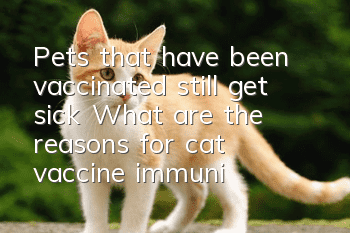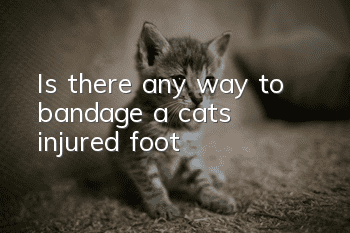Pets that have been vaccinated still get sick? What are the reasons for cat vaccine immunity failure?

Cats have a complete immune program after birth. When we take newborn cats to the pet hospital, doctors often tell us how long it will take to get vaccinated. Through vaccination, cats can be protected from some serious infectious diseases. The dangers, but can we think that everything will be fine after the cat is vaccinated? This is not the case. The cat’s vaccination may also fail for some reasons, causing the cat to become infected with the disease. Pets have been vaccinated and still get sick? What are the reasons for cat vaccine immunity failure!
1. The interval between vaccination and exposure to infectious diseases is too short
Vaccines are not combined It does not immediately stimulate the body to produce antibodies as soon as it is vaccinated. The vaccine works in the cat's body to produce antibodies in the body. It is a complex process, which often takes several days to weeks to produce effective antibodies. For example, against coronavirus, effective protection does not develop until 2-3 weeks after the second vaccine injection. If the cat is already in the incubation period of the disease for some reason before being vaccinated, or the owner does not pay attention to the cat's general care, and the cat has severe parasitic infection, the cat will inevitably become ill after vaccination, leading to the failure of immunity. Therefore, before vaccination, you must first have a detailed understanding of the cat's condition. If the cat has been infected with some diseases, it is best not to vaccinate.
2. Vaccine damage
This is an immune failure caused by some man-made or force-resistant chemicals, often due to improper storage or transportation. For example, if it is knocked over, spilled, or improperly stored during transportation, the attenuated vaccine may become inactivated and cause immune failure. Generally, vaccines should be used as soon as possible after purchase. Large quantities that cannot be used up quickly should be stored in a low temperature, dark, and dry place. Inactivated bacteria (dead vaccines), weakened bacterial vaccines, toxoids, immune serum, etc. should be stored at 2 to 15°C to prevent freezing; attenuated viral vaccines should be placed below 0°C and frozen. The diluent is stored separately and is generally stored at room temperature. If the temperature is higher than 4℃ during the transportation of the vaccine, the vaccine will also lose effectiveness.
3. Improper immunization procedures
Cat vaccination
If the injection interval is too short, interference between vaccines will occur. If the interval is too short If it lasts for a long time, the effect will be reduced. The correct vaccination program for cats should be to inject the first dose of Cat Triplex starting from the 9th week, with a booster every 3 to 4 weeks, and in the first year, the basic immunization injection of Cat Triplex is 2 to 3 times. Kittens can also be vaccinated against rabies only when they are 3 months old or older, once in the first year, and then once every 11 months.
4. Immune Deficiency
If the body's immune system is defective and cannot produce a normal immune response to the vaccine, it will also fail. Congenital immunodeficiency in cats is mainly caused by feline immunodeficiency virus, which is a characteristic syndrome of immunodeficiency in cats.Symptoms are stomatitis, gingivitis and periodontitis, diarrhea or anemia may occur, as well as stubborn upper respiratory tract infection and unexplained fever. There are also neurological symptoms such as behavioral changes, psychosis, dementia, facial distortions or tics. There is currently no effective treatment for immunodeficiency in cats, and treatment is usually aimed at controlling secondary bacterial infections.
- What are the four PCR tests for cats?
- What should I do if my cat sneezes? Symptoms and treatment of cat cold!
- What causes cat diarrhea?
- Bombay cat food taboos
- How to remove black lumps on cat’s nose?
- What are the dangers of eating too many cat strips?
- How to make Chinchilla’s tail fluffy?
- If a cat's butt smells bad, it's probably a disease.
- How long do Chartreuse cats generally live?
- Do Maine Coon cats only know one owner?



